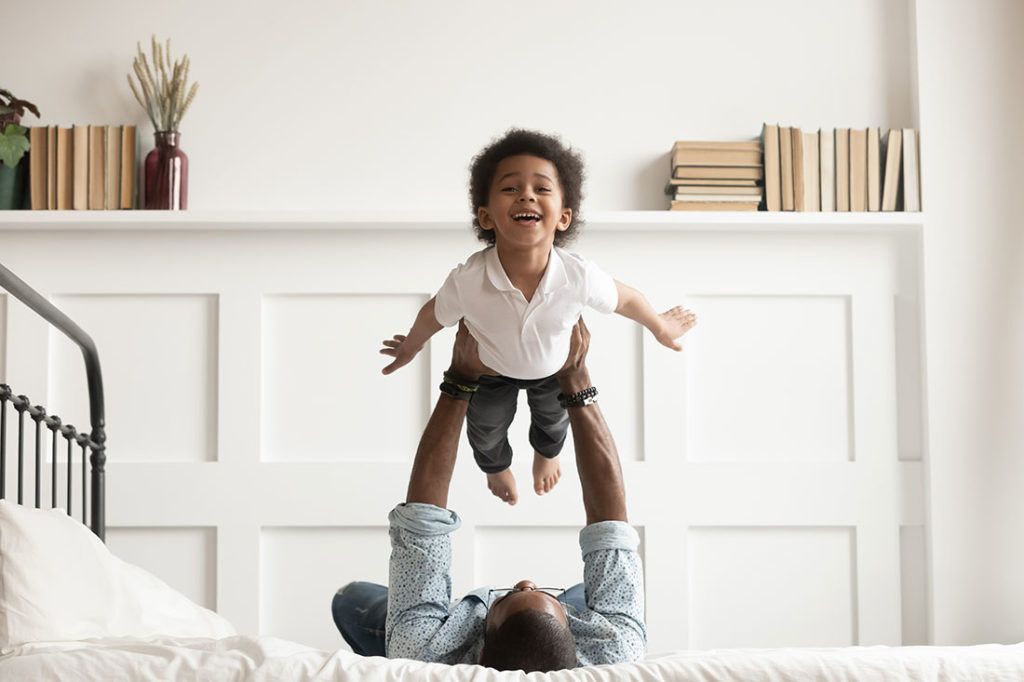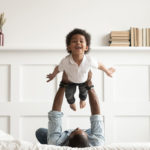He’s sitting in his high chair in a dinosaur T-shirt, holding his little fingers apart and stretching his arms toward me. A pudding-like substance covers his hands, dripping in big globs. The chocolate hummus—his mother’s and my attempt to sneak something moderately healthy onto his T.rex-shaped plate—was a hit.
But now, with a full tummy and sticky fingers, Harrison is ready to get down and play with his toys. I’m obviously not moving fast enough and before I can grab a paper towel to wipe him down, he starts to cry. And so I do what anyone trying to make a good impression on a toddler (and his mom) would do: I lean down, turn my right arm toward Harrison, and offer the sleeve of my white, custom-tailored dress shirt.
“Tank-ooo Addum!”
He smiles, wipes his hands on the $180 napkin, puts his arms around my neck, and lets me lift him out of the chair and down to the floor. Crisis averted, he scurries over to his basket of toys and pulls out a stegosaurus that, at the flip of a switch, lights up, walks and screeches. Gillian, my girlfriend and Harrison’s mom, laughs.
“I can’t believe you let him do that,” she says, looking at my soiled shirt.
“To be honest, neither can I,” I respond. Harrison isn’t my son, but I love him like he is, which means all logic goes out the window. It’s February, nearly nine months since Gillian and Harrison came into my life and two months past his second birthday. I’ve just started to learn what biological parents understand: all the ways, heroic and inconsequential, you become willing to sacrifice your own needs for a child. In the span of less than two years, Harrison has transformed me from a relatively self-absorbed bachelor into someone who would turn a dress shirt into a napkin. Instead of the guy who spent Saturday mornings sleeping off too many craft beers, I became someone who does 7 a.m. Elmo impressions at the grocery store.
Lots of parents experience this radical shift in perspective, sure, and I know I’m not the only person who’s in the middle of what our society euphemistically calls a “blended family.” I chose to date someone with a child from a previous marriage, after all, so it’s not as if the presence of a child in my life was somehow a giant surprise. But I had no way of understanding the profound lessons I would learn about forgiveness, communication, and my capacity to love from a little boy with a T.rex shirt and chocolate-covered hands.
* * *
One of our first outings as a trio was a late summer trip to a large farmers market near where we live.
The extent to which I’d been responsible for a child in public started and ended with holding friends’ babies for a quick second. I was sweating, and for once the summer humidity wasn’t to blame.
We pulled into the parking lot, Gillian unfolded the stroller while I stood by helplessly confused, and the three of us headed straight for a vendor who sells cinnamon sugar-coated doughnuts. As Harrison crammed bites of sweet, warm doughnuts into his mouth, his mom and I popped from stall to stall, gently pressing peaches and lifting tomatoes so juicy they seemed ready to burst.
Our shopping complete, we made for the car. I was feeling pretty confident about the whole experience, so I decided I’d put Harrison into his car seat. I grabbed him under the arms and lifted him straight up—and headfirst into the open tailgate hatch above.
A second passed.
And then the wailing started, loud sobs with gasps for air between them. His face started to turn red, fat tears streamed down from his eyes. I froze, completely panicked about what to do.
Gillian swooped in, kissed him on the forehead, and took over. I apologized profusely—just as concerned about her reaction to all this as his—and then stayed quiet for the 15-minute drive to their house. I don’t like doing things that I’m not good at, and for the duration of the trip, I worried that I wasn’t suited for this, how I couldn’t even get Harrison out of his stroller without nearly giving him a concussion. I resolved that I would scour the internet for everything I needed to know about being a successful grownup, and maybe even a halfway decent babysitter.
By the time we reached the house, Harrison had stopped crying, but I was self-conscious of our interactions. He ran to the playroom, and I followed. I sat on the floor, my back leaned up against a chair. Harrison, unprompted, walked over to me holding a book. Its cover was as long as his lower legs; one corner dragged across the carpet.
“Read dee one,” he said.
And with the earnestness that only a child can project, he scooted into my lap, leaned back and let me open the front cover. He wasn’t holding a grudge because I slammed his head into the car, didn’t like me any less, didn’t assume the worst about my motivations. Tears pooled at the corners of my eyes. I couldn’t remember the last time I approached my professional relationships and friendships without cynicism. What if I treated the people in my life with even just a measure of the sincerity Harrison just showed me?
By the time we made it to the last page, his eyelids had begun to droop. I didn’t say it out loud, but as Gillian and I got Harrison ready for naptime, I knew that I could love this kid in a way that I had never before understood.
* * *
The prevailing challenge of those early months was balance. How Gillian should juggle being a single parent and a girlfriend, figuring out how much time to spend together, the best way to integrate me, slowly, into Harrison’s life.
We started with outings: to a local nature museum, the grocery store, a fall festival. I mastered diaper changes and picked up on the way to sneak healthy food onto his plate. The stroller still baffled me; every time I tried to unfold it, clumsily, it seemed as if every mother in the parking lot was looking at me with a bless-his-heart kind of smile.
Just before Halloween that year, we put Harrison into skeleton-print pajamas and spread out on the front porch to carve pumpkins. His interest in the activity lasted precisely three minutes, after which he hopped around the porch looking for spiderwebs and waving his plastic pumpkin scooping tool in the air. When he started to bang it on a glass-topped patio table, I worried he would break the glass and hurt himself. Without thinking, I yelled. “Harrison! Stop that!”
He backed away from the table. From her spot next to one of the pumpkins, Gillian glared. It was clear I had overstepped my bounds. She was watching him, of course—moms really do see everything—and didn’t need me to intervene.
“It’s just not appropriate for you to discipline him yet,” Gillian said. There was an edge to her voice, mama bear protecting her cub.
“I just didn’t want him to get hurt,” I explained. “I didn’t mean anything by it.”
Our conversation went round and round like this for a bit, until I finally stopped talking long enough to absorb the lesson: Even the best-intentioned actions can be subverted by the wrong words.
In the following months, having a third person in the room for the majority of my interactions with Gillian forced me to be a better listener, to be more fully engaged in conversation and to consider the effect of my words on others. My sentences became more direct, my expressions of emotion more articulate.
When Harrison misbehaves, as toddlers are wont to do now and again, Gillian’s gentle scolding—“Listen. To. Mommy.”—is a reminder for me, too.
* * *
On the night of the first round of the NCAA men’s basketball tournament this past March, Gillian went to a birthday dinner with a small group of her girlfriends. They would drink wine and eat sushi, and I would watch Harrison.
“Be careful of the coffee table,” Gillian texted.
“You ARE worried about us,” I wrote back.
“You just don’t think like a parent yet,” she said.
This is true: A few nights earlier, I had left the handle of a 10-inch chef’s knife precariously close to the edge of the kitchen counter and received an understandable reprimand. (I keep a hatchet on the coffee table at home—“a conversation piece,” a stylist friend told me when he gave it to me. Childproofing isn’t my area of expertise.)
Nevertheless, I felt confident enough in my child-watching abilities, and told Gillian to have a good time with her friends. Harrison and I settled onto the living room sectional, and I flipped on the end of a March Madness game. His cheeks were rosy with playground windburn, and his auburn hair swooped messily across his forehead. For once, his energy was a bit subdued, and he climbed next to me.
“Bassetball?” he asked.
Toddlers don’t care about the differences between zone defense and man-to-man, but I found myself talking to him as if he were much older. I began to envision what it would be like to sit in that same spot in 15 years, talking to him the way my dad talked to me, subtly injecting questions about college visits and girlfriends into less serious banter. Oh c’mon ref, that was totally a foul! So have you given any more thought to your scholarship applications? I mean look at this guy, he’s friggin’ blind!
We stayed up far past Harrison’s bedtime, but by the end of the night, he was yelling two phrases at the TV: “Slam dunk!” which he yelled anytime he saw something even resembling a basketball, and “Beat Duke!” which Gillian taught him, and which any new fan ought to have in his vocabulary.
As we sat there, I realized that I’d become more present, more deeply engaged with another human being than I had been in ages. Other than occasionally replying to a text from Gillian to confirm that, yes, we were still alive, I didn’t use my phone. My time with Harrison had taken on a deeper meaning because I was invested in the quality of our interaction.
I carried him upstairs to his big-boy dinosaur bed and laid down next to him for a few minutes. We talked about slam dunks and when Mommy was coming home from her dinner. I told him the story of the Three Little Pigs, which had become part of his bedtime ritual.
At the beginning of the story, the part about the little pigs going out to build houses of straw, sticks and brick, Harrison interrupted me, just as he always does.
“Big Bad Wolf coming!” he squealed with delight.
He didn’t need to wait till the end for happily ever after. I knew how he felt.
* * *
Through Harrison, I rediscovered those simple joys from childhood, and found myself exclaiming, “I haven’t thought about this since I was a little boy!” as we ran through puddles during a summer rainstorm or made shadow puppets on a wall. I began to protect time in the early evenings: “Nope, I can’t review that presentation right now; it’s dinner time.” Petty drama on social media no longer held my interest; I was too busy trying to find Goldbug in Cars and Trucks and Things That Go.
Some of my friends—single people, but also married couples without kids of their own—seemed baffled by my new lifestyle, as if they couldn’t grasp why I’d want to devote my free time to sitting around reading Green Eggs and Ham, how I could get more joy out of spending time with a toddler instead of them.
Even on the hard days of temper tantrums and potty training mishaps, I felt fulfilled. I’ve heard parents say that the birth of their children shifted their perspective on the world, that it gave them a higher purpose. I understand that, even if Harrison isn’t my biological son.
It’s an August afternoon and the three of us are drawing dinosaurs in a shady patch of Gillian’s driveway. I decided long ago that I want to marry her. The ring’s sitting in my apartment; I’ve planned the autumn proposal.
Harrison hands us pieces of chalk, one at a time, and asks us to draw a dinosaur: a pink stegosaurus, yellow T.rex, purple brachiosaurus, and so on. My art skills are much like my stroller-opening abilities, but you’d never know that by his reactions. He sees a triceratops when I draw a unicorn with a mullet.
By some people’s standards, this has been an unremarkable day. We walked to the grocery store and went to the farmers market. I pushed Harrison on the backyard swing and crawled on the ground to check out a praying mantis. We’ve done nothing extravagant. And yet it is enough. More than enough, really.
My shoulders feel lighter, the way they do after a vacation. I’ve stopped trying to measure my happiness by others’ barometers. I’m content with slam dunks and storytime. Children are a responsibility, and one that those of us who are lucky enough to raise kids ought to take seriously. We have to keep them safe, set them on the right path. But the dirty little secret is that we get better, too. Harrison has pushed me to be the best version of my adult self. I’ve never felt happier, more at ease with who I am and how I interact with others.
It’s rare to have this much time for introspection with a toddler around. Harrison’s knees are covered in chalk dust, and he’s giggling from something we said. He climbs on my shoulder, then darts toward the grass. Gillian calls his name, gets his attention for a fleeting moment.
“What are Mommy and Adam and Harrison?” she asks.
“Um…” he pauses for a second, and then smiles—one of those great big kid smiles that can signal anything from sincere love to a dirty diaper—and then he looks at us and answers.
“A family.”
This article originally appeared in the Spring 2019 issue of SUCCESS magazine and has been updated. Photo by fizkes/Shutterstock








